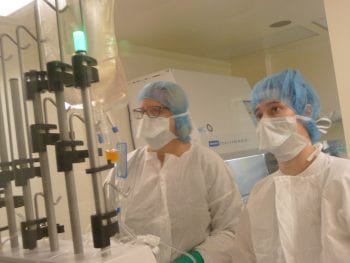
Investigators in the laboratory of John DiPersio, MD, PhD, focus on developing and optimizing many aspects of cellular immunotherapies for cancer.
These can be broadly grouped into two primary efforts:
- Improving the safety and efficacy of hematopoietic stem cell transplants (HSCT)
- Enhancing target cell killing
HSCT Safety and Efficacy
Stem cell transplantation, the only curative therapy for hematological malignancies, is most successful when a sufficient number of cells from a donor are administered to a patient. Painful bone marrow aspirations were previously used to obtain stem cells from a donor. This has now been replaced by techniques that mobilize the stem cells out of the bone marrow and into the blood for easier collection. In our laboratory group Dr. Michael Rettig is further refining mobilization methods in mice to decrease the time and burden on the donor while also increasing the yield of cells.
Before receiving a transplant, patients undergo radiation and/or chemotherapy both to destroy tumor cells and to eliminate many of the native hematopoietic cells in the bone marrow. This provides physical “space” in the bone marrow for incoming donor cells to occupy and proliferate as they establish a strong-hold, (i.e. engraftment). Once there, they regenerate a donor-derived immune system composed of all the normal hematopoietic and immune cells. Dr. Steven Persaud is exploring mouse models in which he can establish engraftment without either irradiation or chemotherapy. This methodology will later be used in patients at Washington University.
Once engrafted, donor cells sometimes not only eradicate the cancer, but also turn against the patient’s healthy cells resulting in Graft vs. Host Disease (GvHD), which can cause severe and often fatal side effects. Many therapies tested in this laboratory are aimed at preventing or alleviating GvHD.
In some patients a few cancer cells will escape elimination by the donor’s immune cells resulting in a relapse of the malignancy. Drs. Michael Rettig and Ezhil Chendamarai are engaged in mouse studies to unravel the mechanisms behind this relapse. These studies are both guided by and compared against genomic studies of samples obtained from relapsed AML and myeloma patients.
Enhanced Tumor Cell Killing
The number of immune cells targeted to kill cancer cells can be increased by genetically modifying immune cells such as T cells and invariant Natural Killer T cells (iNKT cells). Engineering these cells to express what is known as a chimeric antigen receptor (CAR) causes them to home to tumor cells identified by particular markers on their surface, some of which were identified via our genomic studies of patient tumor cells.
Drs. Matthew Cooper, Julie O’Neal, and Miriam Kim along with Julie Ritchey are developing novel CARs (CAR-T cells and CAR-iNKT cells) to target acute myeloid leukemia (AML), multiple myeloma (MM), B cell Non-Hodgkin Lymphoma (B-NHL), B cell acute lymphocytic leukemia (B-ALL) and T cell acute lymphocytic leukemia (T-ALL) as well as related solid malignancies. These researchers are using mouse models to determine efficacy before the CAR-T cells are advanced into human clinical studies that will be done here at Washington University in the Siteman Cancer Center under the guidance of Drs. John DiPersio and Armin Ghobadi.
Because they must be customized to both the cancer type and to individual patients, CAR-T cells are expensive and time-consuming to make. To eliminate the need for customization and thereby save time and patient costs, these investigators are using CRISPR-edited CAR-T cells that would be available off-the-shelf to any patient with a particular cancer type. Likewise the CRISPR technology is being used to eliminate rejection of the CAR-T cells by the recipient’s immune system.
A common side effect of CAR-T cells known as cytokine release syndrome (CRS) can result in considerable patient discomfort, neurological problems, and sometimes death if not promptly treated. Drs. Matthew Cooper, Parmeshwar Amatya, and Alun Carter are investigating causes and ways to prevent or alleviate this problem in mouse models.
Another means to harness more T cells to respond to and eliminate cancer cells is to inject patients with bispecific antibodies that engage both their immune cells and cancer cells. Drs. O’Neal, and Ramzi Abboud as well as Julie Ritchey are developing novel bispecific antibodies against AML and multiple myeloma and testing them in mouse models that can be directly translated into patients. Dr. Rettig also is involved in correlative studies assessing the outcome of using such reagents in patients in trials at Washington University.
Research Advancements
Significant research accomplishments within the DiPersio lab include:
- FDA approval of rapid stem cell mobilizing agents for stem cell transplantation
- FDA approval for the first drug (ruxolitinib) approved for the treatment of acute GvHD
- Led the world in developing and testing bi-specifics for the treatment of AML
- Developed the first CRISPR gene-edited and fratricide-resistant off-the-shelf CAR T for the treatment of T cell malignancies
- Contributed to understanding of genomic and epigenomic changes for AML relapse after both chemotherapy and allogeneic stem cell transplant
- Led to the founding of two companies focused on stem cell transplantation (Magenta Therapeutics, Cambridge, MA) and gene edited CART (WUGEN, St. Louis, MO)